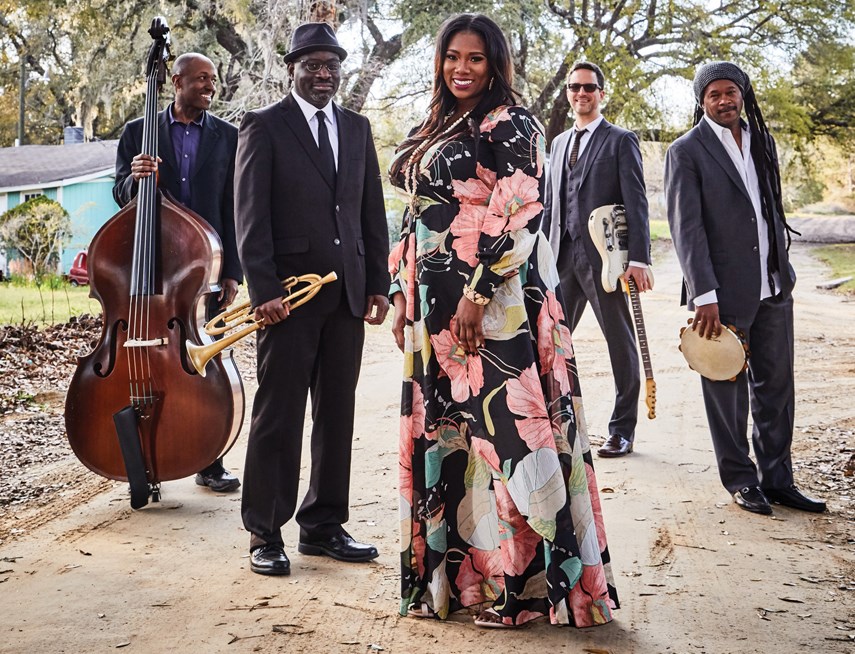Ranky Tanky, The BlueShore at CapU (Birch Building), Saturday, March 30, 8 p.m. Tickets: $38/$35 (tickets.capilanou.ca)
There’s the band called Ranky Tanky, and then there’s the expression “Ranky Tanky.”
Loosely translated, the expression means to “work it,” or “get funky,” as a way to alleviate pain, whether that’s the physical pain wrought from a day’s work or the mental fatigue fashioned from life’s everyday burdens. Either way, when life’s getting you down, you need to start groovin’.
“Imagine some little kids singing this song, or doing this, and they say, ‘Pain in my hand,’ and they shake their hand. Work it out. Get it out. ‘Pain in my leg’ – shake your leg. Ranky Tanky,” explains Charlton Singleton, who plays trumpet in the band Ranky Tanky, when describing the expression – the band’s namesake – and its connection to traditional African-American songs, games, chants and riddles borne from the lineage of American slave culture.
Today, the Gullah people who inhabit the Sea Islands region of South Carolina are the descendants of Africans captured along the West Africa coast hundreds of years ago. Brought to America, the enslaved toiled for generations under the hot sun while what limited cultural traditions from back home they still had were severely limited by their bondage. But new traditions would eventually emerge called Gullah, a mixture of African and English styles which manifested in its people’s own unique art, food, language, music and culture.
Singleton, who grew up in a Gullah community called Awendaw approximately 25 kilometres north of Charleston, S.C., describes Ranky Tanky’s sound as inspired by the Gullah music he, along with four-fifths of the rest of the band, was immersed in growing up.
“The rhythm that I heard is that Gullah rhythm that we celebrate so much in Ranky Tanky. It’s the rhythm that you can find in just about any African-American church going up and down the Gullah-Geechee Corridor from Wilmington, North Carolina down to the bottom of Georgia and just into Florida – that rhythm, it’s there,” says Singleton, adding that there’s a beat or a specific rhythm, whether the song’s fast or slow, which is unique to Gullah music.
The story of Ranky Tanky forming is the story of coming together and then fading away before coming back together again, according to Singleton. Band members Quentin E. Baxter, Kevin Hamilton, Clay Ross and Singleton first joined forces as a jazz quartet in the 1990s before breaking up to pursue other projects. However, the foursome kept in touch. A few years ago, guitarist Ross had an idea which would bring the former bandmates and longtime friends back together.
“One day [Clay] got in touch with us all and said, “There are a lot of people out there in the world that are playing music from their region, the sound of their particular state, or their country or the area that they grew up in. Why not us?’” explains Singleton.
The foursome agreed, eventually forming the band after adding powerhouse vocalist Quiana Parler. In 2017 they released their self-titled album to wide acclaim.
When talking about Gullah, it’s important to keep in mind that “you’re going way far back” into the 1800s, says Singleton.
“This is before blues, this is before you talk about jazz, this is before you talk about folk and country and all of that stuff,” he says. “What we do in Ranky Tanky is we continue to use that sound – but we also put a little contemporary spin on it.”
Early Gullah musicians relied on their voices, their hands to clap and their feet to stomp when it came to making music, explains Singleton.
“Just us having a full drum set is already making it a contemporary assessment and a version of the music,” he says.
After releasing their debut, the album quickly shot to the No. 1 spot on places like the Billboard jazz charts and iTunes, and since then it’s been a rather meteoric rise for the band, who recently debuted a new song nationwide, “Freedom,” on the Today show.
“I think that it just resonates with everybody,” says Singleton. “There’s something about our songs that we have chosen from the Gullah community to perform that just about everybody in the audience can relate to.”
Singleton notes that people in the audience are often surprised to learn that the spiritual song “Kumbaya” originated as a piece of Gullah music that’s more than a hundred years old, before it became a well-known staple during the folk revival in the ’50s and ’60s.
But when the band performs, most people are particularly taken with a song called “That’s Alright” which lays bare the message that any number of things good or bad can happen in life, but redemption is always possible, says Singleton.
“That’s the chorus, the chorus is: ‘That’s alright, that’s alright, that’s alright, that’s alright, as long as my soul’s got a seat up in the kingdom, that’s alright.”



